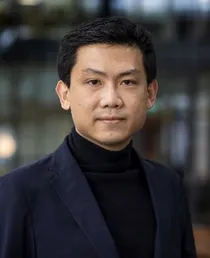
Dr. Vincent Irawan, M. Eng.
Research Scientist
Technical University of Munich
TUM School of Engineering and Design
Chair of Bioseparation Engineering
Boltzmannstraße 15
85748 Garching
| Phone: | +49.89.289.15747 |
| Fax: | +49.89.289.15766 |
| Room: | 2404 |
| E-Mail: | v.irawan@tum.de |
Profile:
Dr. Vincent Irawan received his PhD in Material Science and Engineering from the Tokyo Institute of Technology, Japan, in 2019. His previous research focused on developing the collagen materials as a bioactive scaffold for promoting cartilage and bone tissues. In 2021, he undertook a postdoc position in Eindhoven University of Technology, the Netherlands, to learn about the supramolecular biomaterials and to develop such multi-modular materials for the applications of biomedical imaging and the stimuli-responsive cell culture materials. Dr. Vincent`s MSCA fellowship will focus on preparing a tissue-engineering product that mimic the cartilage tissue by developing an innovative technique that is premised on the tuning of substrate stiffness during the cell culture stage. The application is focused on the regeneration of osteoarthritic cartilage tissue.
Research Interest:
1. Inorganic particle synthesis
2. Soft material formulation and characterizations
3. Cell biology
4. Mechanobiology
5. Tissue engineering
6. Regenerative medicine
Project description:
Magnetically Tunable Chondrocyte Cell Sheet Engineering for Osteoarthritis Therapy (MACROS)
Degenerative diseases, such as osteoarthritis or macular degeneration, progressively impair the function of particular tissues in human body, resulting in the unceasing of patient's suffering. These diseases can be treated by implanting the lab-made functional tissues or known as "tissue engineering". In a nutshell, tissue engineering involves the culture of living cells in an artificial environment, namely a standard culture plate. This environment lacks the appropriate physical cues, such as stiffness or surface properties, that are capable of priming the cells to produce the "correct" tissues. Moreover, the strong enzymes are also used to handle the cells in the process. These results in the inferior regenerative outcome.
To address these challenges, I aim to develop a universal stimuli-responsive cell culture materials that is capable of providing the appropriate physical cues based on the cell's demands. The proposed cell culture material will be built by combining two different stimuli-responsive materials, i.e., the magnetic nanoparticles (MNP) and supramolecular materials. With this material, one can expect to produce the high quality tissue-engineering products that will bring real impacts to the regenerative medicine field and eventually to the patients of degenerative diseases. This project is highly interdisciplinary and currently funded by EU under Marie Curie Scheme.
I am looking for the prospective students to contribute to this new and exciting project. The participating students will have the opportunity to gain research experiences and skill sets in the material synthesis and analysis, and the cell biology works. By joining this project, the students will contribute the meaningful contributions to the field of material science, tissue engineering, and regenerative medicines. If necessary, I will support the research funding applications of the interested students. Please contact me about this opportunity and how you can get involved.
List of publications
https://scholar.google.com/citations?user=Xu9a5h4AAAAJ&hl=en&oi=ao